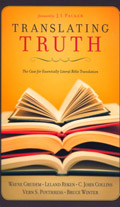
Wayne Grudem, Leland Ryken, C. John Collins, Vern S. Poythress, and Bruce Winter
Reviewed by: James W. Scott
Translating Truth: The Case for Essentially Literal Bible Translation, by Wayne Grudem, Leland Ryken, C. John Collins, Vern S. Poythress, and Bruce Winter. Published by Crossway Books, 2005. Paperback, 157 pages, list price $14.99. Reviewed by New Horizons managing editor James W. Scott.
This book consists of five essays originally presented as papers to the annual meeting of the Evangelical Theological Society in 2004 (with a foreword by J. I. Packer). The purpose of the collection is to promote the "essentially literal" approach to Bible translation, which is the approach of the English Standard Version (see its preface). Not coincidentally, the five contributors were members of the Translation Oversight Committee for the ESV; and the publisher of this book is also the publisher of the ESV.
Literal ("word-for-word") translation seeks to preserve the verbal patterns of the original text as much as the receptor language allows (and even expanding its vocabulary, as necessary). It is set over against "dynamic equivalence," which aims more at "thought-for-thought" translation and can become periphrastic. Since a "strictly" literal translation tends to be artificial, sometimes putting words together in ways that don't make much sense, the "essentially" literal approach seeks to reduce that problem by making fuller use of the resources of the receptor language.
In my judgment, the essentially literal approach is sound. The translation of an ancient text should take the reader back into the past, not bring the writer into the present. We want to know what the writer actually did say in his day, not what he might have said in our day. Furthermore, the Word of God should enrich and sometimes restructure the categories and concepts of each culture to which it comes, and not itself be restructured in translation so as to affirm the categories and concepts of the target culture.
These essays do a good job of handling a wide range of pertinent issues. Wayne Grudem argues from verbal inspiration that the meaning of each of God's original words should be preserved in translation; important details are often lost in dynamic-equivalence translations, and new meaning is often added. Leland Ryken refutes the charges that essentially literal translation is idolatrous "word worship," naive, mere transcription, interpretive anyway, and unnecessarily obscure. C. John Collins argues that an essentially literal translation is best suited for use in church, family, and study, because it enables the modern reader to hear the original communication and preserves the full interpretive potential of the text. Vern Sheridan Poythress warns against reductionistic approaches to language analysis and translation. Bruce Winter argues that since Paul wrote his letters in a plain style, focusing on clarity, they should be translated similarly.
The foreword and the first three essays present powerful arguments for essentially literal Bible translation. However, the final two essays, though useful in their own right, are only peripheral to the issue at hand. Nonetheless, I would recommend the book as a good defense of what is probably the best approach to Bible translation.
March 01, 2026
February 15, 2026
February 01, 2026
January 25, 2026
January 18, 2026
January 11, 2026
Texts that Transform: Church and Ministry
January 04, 2026
© 2026 The Orthodox Presbyterian Church